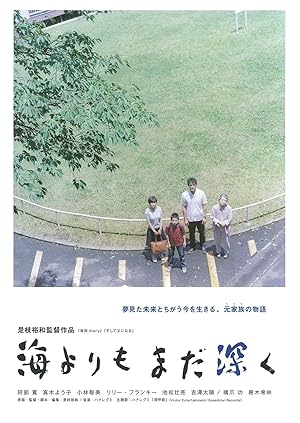Hirokazu Koreeda directed After The Storm; therefore you must see it even if you hate subtitles because he is one of the best living directors. After The Storm depicts family members’ lives with particular focus on the adult son shortly after the death of his father. After The Storm poses an unspoken question: will this man follow in his father’s footsteps or try to be a better man? When we meet him, he is already doing worse than his father because he is divorced and does not live with his son. After The Storm compares and contrasts the reality of life with what you imagined life should be and how you react to the chasm between the two determines how well you can connect to others and yourself.
After The Storm avoids all the sentimental, melodramatic pitfalls of American movies about family, midlife crises and death and never goes for the cheap, happy resolution. Koreeda is a master of simplicity, realism, subtlety and nuance. Even when characters act unwisely or are repugnant, After The Storm still sympathizes with them and treats them tenderly as three-dimensional characters. After The Storm is rooted in a world with consequences while not condemning people for making poor choices. There is an unflinching tenderness between the characters when they call each other to account for his or her actions without minimizing the resulting damage.
After The Storm explores the human condition of aging and identity, not only in terms of family dynamics, but also in terms of careers versus jobs. For instance, when you are young, you have potential. When you get older, you stop being evaluated based on potential and start being judged by your achievements. If too much time passes between achievements, you get written off as a has-been and are no longer a person with potential, and you can suddenly be seen by others as worthless or potentially settle for not being special and just being adequate to survive. Hiroshi Abe does an amazing job portraying a complete loser bag, but simultaneously shows how he was and could be more. He plausibly and simultaneously creates the potential for his character to stay on the same track, devolve or improve. Because some concepts get lost in translation, until the end of the film, I did not fully understand the significance of handwriting and the technique discussed in the film.
I did not know until after watching After The Storm that it was completely filmed while Koreeda was filming and released after Our Little Sister. How many directors can make two masterpieces at the same time? I am so fortunate to finally have an opportunity to see a Koreeda film on the big screen for the first time. Even though After The Storm was 1 hour 57 minutes, I was riveted the entire time and am dismayed that the theater was not filled opening weekend. After The Storm may show that you can never go home again, you will never be as great as you imagined you could be or want to be, but you should value the present and create home there with what you have instead of yearning for an idealized, imagined past or future that can never exist in the present. By living fully in the present, the future can actually be better, and the only part of the past that is repeated will be beneficial, not damaging.
Side note: 150,000 yen equals about $1,382.74.





